From Downbeat to Living Blues, from the Chicago Tribune to The Reader and from Europe to South America, Bob Stroger & The Headcutters receive 5 star reviews.



Bob Stroger: A Country Boy Playing the Blues
By Aaron Cohen – Downbeat Magazine
JUST BEFORE THE COVID PANDEMIC, bassist Bob Stroger’s touring itinerary took him around the world. He also recorded the recent- ly released at’s My Name (Delmark) with his Brazilian blues band, e Headcutters, near their country’s southeast coast. Now that venues are re-opening, Stroger has picked back up where he le o . At 91, he sees no reason to slow down.“As long as I satisfy my fans, I’ll keep going,” Stroger said from his home on Chicago’s South Side. “I never think about retiring from music. When you retire, if you have the money, you trav- el. So I’m retired now because I travel around the world doing this.” at’s My Name encapsulates Stroger’s wide and lengthy experiences. His compositions, espe- cially the title track, showcase his amiably spa- cious bass lines and expertise in this music’s his- tory. He embraces material by artists ranging from early blues singer Ma Rainey to jazz band- leader Jay McShann. He also revisits pieces that some of his former colleagues wrote, including Eddie Taylor. Such versatility has always been crucial for his work.“My style changed when I played with Otis Rush, then when I played with Eddie Taylor,” Stroger said. “ en when I played with Snooky Pryor I changed styles again. I had to listen and nd styles that t their playing. With this CD, I didn’t want all the songs to sound the same. So I played all of my heroes.” e album also highlights Stroger’s quietly compelling voice. Still, he remains humble about his subtle delivery’s emotional impact.“I’m my biggest critic, I just sing my personal- ity,” Stroger said. “A lot of good singers can sing like di erent people, but I can’t. I sing the way I talk. I’m a country boy, and it shows in the wayI’m singing.”That country boyhood was spent in Hayti,Missouri. As a young adult, Stroger moved to Chicago, where his father worked for a railroad and, fortuitously, they lived near a hotbed of the city’s thriving West Side blues scene.“When I was living on Oakley Avenue, Silvio’s was on Lake Street,” Stroger said. “I could walk out my back door and look in the window of Silvio’s and I saw Muddy Waters, Hubert Sumlin, Howlin’ Wolf. I saw all the big guys. I never had a suit and they were wearing suits and ties and I said, ‘I really want to do that.’ When I was in the country cotton elds, we didn’t have the college education and music was the only thing I could do to get recognized. So I went that route.”Stroger also developed his technique across di erent idioms. He played in R&B groups and with jazz saxophonist Rufus Forman before becoming blues guitarist Eddie King’s bassist throughout the 1960s. ese encounters contin- ue to shape Stroger’s sound.“A lot of people said I was a smooth bass play- er because I play a lot of chromatic notes,” Stroger said. “And that’s kind of smoothing it out, that’s where my style comes from. I think it comes from picking up the jazz notes and some of the stu you do on upright bass.”Bandleaders Otis Rush and Sunnyland Slim admired that approach and included Stroger in their ensembles as more global festivals fea- tured blues artists during the 1970s and 1980s. Gradually, he started releasing records under his own name, starting with In is House: Live At Lucerne, Vol. 1 (Crosscut) in 2002. Nowadays, his main inspiration for recording is to spotlight his international collaborators, primarily e Headcutters. —Aaron Cohen- Downbeat

Chicago blues bassist Bob Stroger, now 91, shows no signs of slowing down as he releases new album
By Steve Knopper Chicago Tribune | Mar 21, 2022

Junior Parker, the Memphis bluesman famous for ‘50s and ‘60s hits like “Mystery Train” and “Feelin’ Good,” needed someone to talk to when he was on the road. So he ratchet-jawed with Bob Stroger via CB radio en route from Chicago to St. Louis. “When he moved to Chicago before he passed, he’d be on his way back down South, and we had some powerful two-way radios,” recalls Stroger, the 91-year-old blues bassist. “Something to do. I always liked gadgets.”
Stroger’s new album, “That’s My Name,” is a travelogue of blues history, with detours through old friends and collaborators, like singer and bandleader Parker, who moved to Chicago in 1968, three years before he died. And Eddie Taylor, a guitar-playing friend and local blues fixture who died in 1985. The first track is a cover of Parker’s “What Goes On In the Dark”; the second is Taylor’s “Just a Bad Boy.” “I just wanted both guys to be part of my CD,” Stroger says, in a phone interview from his Chicago home. “When I sang their tunes, I can feel them, you know?”
“That’s My Name,” recorded with Stroger’s longtime touring band, the Headcutters of Brazil, includes five of the veteran bassist’s original songs, including the title track, “I’m a Busy Man” and “Come On Home,” plus tracks by blues masters like Big Bill Broonzy and Ma Rainey. “Some tunes on it are my tunes — something about my life,” Stroger says.
Stroger’s life story, like much of the blues, corresponds to the Great Migration. He was born in Hayti, Missouri, and his father was a sharecropper who moonlighted as a guitarist. Bob left Missouri for Chicago for the first time in 1947, when his father had a job on the Wabash Railroad; he returned to Chicago permanently in his early 20s, living with his older brother, John. “When I was down South, I didn’t see nothing but multiple cotton fields,” Stroger says. “When I first came here, we moved to the West Side. I used to get on the streetcars and ride from one end to the other. Every place I looked up was tall buildings. I had moved to another world.”
The Strogers lived so close to Silvio’s, at Lake Street and Oakley Boulevard, that Bob could look through their back door and see into the blues club’s window, as he told Big City Rhythm & Blues last year. Through a family connection, he soon wound up as a driver for singer-guitarist J.B. Hutto’s band, the Twisters, then picked up the guitar himself. “I tried to go and play a little jazz, and I almost starved to death doing that,” he says of the late ‘50s, when blues was overtaking jazz as a phenomenon in local clubs. “I got back into R&B and I was playing Motown stuff.”
Eventually, Stroger switched to bass to accommodate another guitar player, and rising West Side star Otis Rush happened to need a bass player shortly after that. The Chicago blues names for which Stroger provided pristine, jazzy basslines over nearly seven decades included pianist Sunnyland Slim, guitarist Eddie King, harpist Carey Bell and pianist Pinetop Perkins, an especially close friend.
“Sunnyland Slim was really my mentor. He’d say, ‘Be on time and look decent, because your dress code is 50% of your job,’” says Stroger, known for his immaculate stage outfits; a round cowboy hat; and combinations of coats, vests and ties. “Otis let the bass and drums call the shots in the band. He gave me my first job going to Europe. Lots of guys took me by the hand and pulled me along.”
He encountered the Headcutters after touring Brazil with bluesmen Willie “Big Eyes” Smith and guitarist Bob Margolin for the first time about 12 years ago. Since then, he has played the country’s Mississippi Delta Blues and Heritage Festival annually. “The Headcutters are just like my kids. We’re almost like a family,” Stroger says. “They took me on and call me their godfather.”
Stroger had no intention of slowing down on gigs, even in his late 80s, until the pandemic in March 2020. Stroger had been performing in Switzerland and found himself stuck there for three months, staying with a friend. Upon returning home, living alone in Chicago, he was careful about quarantining. “It was really hard on me. I’m so used to singing with people, taking pictures, and now you don’t want to do anything wrong,” he says. “I’ve never been through nothing like this.”
Stroger, who is fully vaccinated and has returned to the stage in recent months, planning tour dates in Switzerland and elsewhere, spent much of the pandemic giving lessons through the Pinetop Perkins Foundation. He was reluctant, at first, but came around to passing along his experience of nearly 70 years of carrying his bass through airports — as well as playing, of course. “I don’t read music. It’s not in my repertoire to teach. I don’t think I’m a good teacher,” he says. “But I just pass along some of the things I know. Anything I can do to bring the next generation along, I’m willing to step up and do it.”
ROOTSTIME REVIEW by Eric Schuurmans
“He had a glorious musical career and played with the greatest.
He has appeared on more than 30 Delmark releases…”
Bob Stroger, now 91, is a bassist and singer-songwriter. He has worked with many well-known blues musicians such as Eddie King, Otis Rush, Jimmy Rogers, Eddie Taylor, Eddy Clearwater, Sunnyland Slim, Louisiana Red, Buster Benton, “Homesick” James, Mississippi Heat, Snooky Pryor, Odie Payne, Fred Below. , Willie "Big Eyes" Smith and Billy Davenport.
Stroger was born in Missouri, near Hayti. When he was 16 his family moved to Chicago, Illinois. In Silvio's nightclub, near the apartment where they lived, Howling Wolf and Muddy Waters performed. Bob became so fascinated by the music he heard that he also wanted to become a musician. He married quite young and often went to performances by his brother-in-law Johnny Ferguson, who, along with J.B. Hutto in The Twisters. Stroger learned to play the guitar at home and founded a family band with his cousin Ralph Ramey, The Red Tops (since they all wear a black cap with a red circle on top as a uniform). His brother John Stroger was the drummer for the band. Because his brother-in-law was not allowed to travel by his wife, his brother John formed a new band with Willie Kent and Bob, Joe Russell & The Blues Hustlers. Bob Stroger played with Rufus Forman in a jazz band for about three years, because he wanted to see more of the world. During a meeting with Eddie King (1938-2012), Bob told King that they were looking for a blues guitarist. King joined the band. This was the start of a long career as a bassist/blues musician for Stroger. Stroger can be heard on Eddie King's single "Love You Baby" (1965). Stroger played in King's band. First in Eddie King & King Men and after a brief split, over fifteen years, in Eddie King & Babee May and the Blues Machine. After a hiatus of several years, Stroger joined Otis Rush (°1936)'s band in the fall of the 1970s and the 1980s, through Jessie Grean when he played with Morris Pejo, who were looking for a bassist. They toured (also) in Europe. Stroger can be heard on several albums by Rush (“Live in Europe”, 1977 – “Lost in the Blues”, 1977).
As a session musician, Stroger worked in the late 1980s and early 1990s with Sunnyland Slim, Mississippi Heat, and Chicago blues drummer Odie Payne (1926-1989). In 1996, Stroger played on Mark Hummel's album "Heart of Chicago" and in 1997, on Golden "Big" Wheeler's album, "Jump In". Stroger's debut solo album came in 2002 after a performance at the Lucerne Blues Festival' in Switzerland: 'In the House: Live @ Lucerne, Vol. 1'. It also features pianist Ken Saydak and blues guitarist Billy Flynn. In 2007, Stroger recorded "Back in Town" with Steve Freund (guitar), Willie "Big Eyes" Smith (harmonica), Deitra Farr (backing vocals) and Juli Wood (baritone sax). Also in 2007, Stroger can be heard on Carey Bell's last album (1936-2007' 'Gettin Up: Live @ Buddy Guy's Legends Rosa's'. Stroger can also be heard on Willie "Big Eyes" Smith's "Born in Arkansas" (2008 ) and 'Joined at the Hip' (with Pinetop Perkins) (2010).In 2011 and 2013, Bob Stroger received a Blues Music Award from the Blues Foundation in the “Best Blues Bassist” category.
“But my real name is the blues…”
With his Brazilian band The Headcutters and guest organist Luciano Leães, he recently recorded 'That's My Name' for the first time as front man at Delmark, an album with only old skool blues, 'That's My Name'. Of the 13 tracks, five are original*, covers include Ma Rainey, Eddie Taylor, Big Bill Broonzy, Casey Bill Weldon and Herman “JR” Parker Jr. The Headcutters were founded in September 1999 by four childhood friends. Joe Marhofer (harmonica and vocals), Ricardo Maca (guitar), Arthur Catuto (acoustic bass) and Leandro Cavera (drums) are Bob's ideal rhythm section. Bob Stroger opens very relaxed with the first Herman “JR” Parker Jr. track, “What Goes On in the Dark” that gently sways to the melody carried by Bob's soulful vocals, Joe Marhofer's unobtrusive harmonica, and the smoothly swinging organ of guest star Luciano Leães. Eddie Taylor's "Just a Bad Boy" is a quiet pumping shuffle with the harmonica again taking center stage alongside Ricardo Maca's raspy guitar. Stroger then clearly enjoys Ma Rainey's well-known "CC Rider", the first of two originals, "I'm a Busy Man" is a dark slow blues and ghost of Peter Green haunts. “Come on Home” is actually a funk song, “Move to the Outskirts of Town” a slow blues à la lettre and “Keep Your Hands off Her” the first uptempo song, which Bob and Leães do well here on honky tonk piano . On Parker Jr.'s slow blues, "Stranded in St. Louis", The Headcutters, it may be said, impress with their excellent playing. Bob and Marhofer confirm that he likes beautiful ladies on “Pretty Girls”, on Big Bill Broonzy's “Talk to Me Mama” Bob and Marhofer go full steam ahead and in the revealing closing track, the lively “That's My Name” Bob shows us the following know: “You can call me Bob Stroger or what you want, but my real name is the blues…”.
“Immortal already, but still and Bob Stroger shows that on ‘That’s My Name’, in the first place a sincere and real blues man…” (ESC for Rootstime)
CLICK IN THIS LINK TO READ THE ORIGINAL FLEMISH ARTICLE

Monthly Album Spotlight:
Bob Stroger & the Headcutters That’s My Name
That’s My Name by Bob Stroger and a band called the Headcutters is a first-rate example of a nearly forgotten artform. They play lo-fi, post war, Chicago blues with authority. Stroger’s vocals have a relaxed, unhurried, self-assured quality that has been all but neglected in the modern blues world. The band’s accompaniment of Stroger is nothing short of sublime. If these two musical entities sound like they fit like a very comfortable pair of old shoes, there is a very good reason.
Through the years veteran Chicago blues man Bob Stroger has played bass on records and in concert with an embarrassing amount of Chicago blues greats. To list his duties as a side man reads like an official who’s who of Chicago blues legends. Suffice it to say at 92 years old he has been there and done that.
Back in December of 2012, Chico Blues of Chico Blues Records renown and Sao Paulo, told me about a band on his label from Brazil, The Headcutters. He thought they would make a good interview subject and that their music would be something that would be a good fit for me and our readers. I told my friend what I tell everybody, ‘Let me hear the music first. If I like it, then we can talk.’ Chico mailed me their 2010 CD, Back to 50’s. As per usual, Chico was right.
I told Chico that he can give my contact info to the band’s representative and we can set something up. I heard almost immediately from a gentleman named Joe Marhofer. He was the band’s vocalist and harp player. He was young dedicated, enthusiastic, very earnest and quite knowledgeable about his craft. We hit it off immediately.
It wasn’t long before he told me of his band’s plans to try and obtain a cultural visa and grant from the Brazilian government to allow and facilitate a trip to the historical home of the blues, the United States.
After folks were able to read my interview in BLUES JUNCTION with Joe, which was, I am very happy to recall, very well received, I began pitching the band to promoters with a view to book enough dates to make their trip here to the states worthwhile.
This finally happened at the end of September and early October of 2014.
Here in Southern California the only person to step up to the plate was blues promoter Art Martel. Even back then, I had known Art for some time and as it turned out he was the perfect fit for this task. He is a hard charging promoter, who wears his enthusiasm on his sleeve and knows a good thing when he hears it. He was able to string together a handful of shows in the greater Los Angeles area for The Headcutters.
The band then headed to Chicago for a couple of dates before taking a train down to perform at the King Biscuit Blues Festival in Helena, Arkansas.
Starting back in 2009, Bob Stroger hooked up with these four unlikely, if not like-minded, individuals from a fishing village on the Atlantic Ocean in southeastern Brazil. The Headcutters first played with Stroger that year at the Mississippi Delta Blues Festival in Caxias do Sul, Brazil. They played with Stroger at this festival for the next ten years before the event was suspended due to the Covid-19 pandemic in 2020. From 2009 to 2019, The Headcutters would become the most consistent and, perhaps, most prolific collaborators in Stroger’s very long career. The culmination of this inter-generational, inter-continental kindred spirits has made a modern-day, old-school work of art with That’s My Name.
They had played straight head, gut bucket, traditional blues with “Smiling” Bob Stroger over 100 times in concert before they stepped into the studio In November, 2019, to record That’s My Name.
The Headcutters are guitarist Ricardo Maca, Arthur “Catuto” Garcia on bass, and drummer Leandro “Cavera” Barbeta, as well as the aforementioned Joe Marhofer. These four have been together for over twenty years. Guests on That’s My Name are Luciano Leases on piano and B3, as well as Braion Johnny handling saxophone duties.
That’s My Name is a thirteen-song program which includes five Stroger originals and covers that include tunes by Eddie Taylor, Big Bill Broonzy and two numbers by Little Junior Parker and others.
That’s My Name is the first time Stroger has recorded an album under his own name on Chicago’s preeminent traditional blues label, Delmark Records. He has finally arrived, yet when he got here, Stroger found this group of musicians from 5,360 miles away who sound like they have been here the whole time.
– David Mac

Blues bassist Bob Stroger drops a new album 70 years into his career
The natty 91-year-old has been a rock-solid sideman for longer than most people have been alive, and That’s My Name proves he’s just as good at leading a band. by Steve Krakow February 23, 2022

Since 2004 Plastic Crimewave (aka Steve Krakow) has used the Secret History of Chicago Music to shine a light on worthy artists with Chicago ties who’ve been forgotten, underrated, or never noticed in the first place.
In the more than 15 years I’ve been writing the Secret History of Chicago Music, I’ve often tried to give props to the past and present venues and labels that support the underappreciated musicians I cover. Local label Delmark Records is the epitome of such an institution. The infamous Bob Koester ran the label from 1953 to 2018, releasing pivotal records by Windy City artists such as Magic Sam, Roscoe Mitchell, Mighty Joe Young, and the Art Ensemble of Chicago. When Koester retired, he sold Delmark to Julia A. Miller and Elbio Barilari, and this month the label is releasing a new long-player by famously natty 91-year-old Chicago blues bassist Bob Stroger. Because we just lost the venerable Jimmy Johnson (at age 93) and his soulful brother Syl (at 85), I’m especially keen to honor our elders while they’re still with us.
Born in Hayti, Missouri, on December 27, 1930, Stroger lost his mother when he was just five. His father, a sharecropper by day, played guitar at parties at night. “It was hard for us because when we got big enough to pick and chop cotton we had to just about pull out of school,” Stroger told the magazine Big City Rhythm & Blues in 2021. “That’s why my education isn’t that good—we had to work on the farm.”
Stroger’s father landed a job with a railroad in Saint Louis, then rode the rails to Chicago and started working for the long-gone Wabash Railroad. Stroger was 16 at the time, and made his first trip to Chicago that year to visit. He came to Chicago for good in his early 20s, moving in with an older brother who’d just finished his military service.
“My brother John, who is five years older than me, got married young—I was living with him and his place was around the corner from the old Silvio’s at Lake Street and Oakley,” he recalled in the same 2021 interview. The bluesmen at that west-side nightclub made a huge impression on Stroger. “You left your windows and doors open a lot in summer—from our open back door I could look into the window at Silvio’s—and hearing that music really inspired me. Wolf, Muddy, all those guys would be playing until early morning—and then they’d all go to someone’s place for a house party for the rest of the night!”

Bob Stroger accompanies pianist Ben Levin and his father, guitarist Aron Levin, at Rosa’s Lounge in October 2021.
Stroger’s brother-in-law, Johnny Ferguson, was playing guitar in a band called the Twisters with bluesman J.B. Hutto, which inspired Stroger to take up the instrument himself. He started out by driving the Twisters to gigs, but soon he put together his own combo, the Red Tops, which was something of a family band: it included Ferguson, Stroger’s brother John on drums, and Stroger’s cousin Ralph Ramey on harmonica. As a gimmick, each member wore a black beret with a red circle on top—proper band outfits could give you a leg up in the club scene.
Ramey couldn’t tour, though, so Stroger and his brother retooled the band: John adopted the name Joe Russell, and they started calling the group the Blues Hustlers. They brought in future blues bassist Willie Kent to sing—he had yet to pick up the instrument that would make him famous, and according to Stroger, ended up doing so only when a bandmate got too drunk to play his!
Stroger’s own switch to bass was probably foreordained, since he’d already been playing his guitar tuned down an octave when nobody else wanted to fill that role. In his professional life, it arose from a gig playing guitar with jazz saxophonist Rufus Forman. Forman hired blues guitarist Eddie King—Stroger thinks it was in 1959—and because jazz gigs were drying up, King took over the band. They needed a bassist, so Stroger stepped in.

Bob Stroger appeared on the 1960 single “Love You Baby” early in his long partnership with Eddie King.
The partnership Stroger developed with King would prove to be a long one, lasting around 15 years. On King’s 1960 debut single for J.O.B. Records, Stroger plays bass: “Love You Baby,” credited to Eddie King & the 3 Queens, is a blast of raw and reverbed R&B with some intricate subtleties, and also features Rico Collins (sax), Detroit Junior (piano), Robert Whitehead (drums), and of course the 3 Queens (vocals). Stroger stuck with King through several bands, including the Kingsmen (not the “Louie Louie” Kingsmen) and a group fronted by King’s sister, Mae Bee Mae (also billed as Mae B. May) called the Blues Machine. (King would later back Koko Taylor and take the Blues Machine name to her.) After King moved to Peoria in 1973, Stroger took a break for a couple years because he didn’t feel like jamming with anyone else.
At that point Stroger was still working a day job as an exterminator, but in the late 70s he was recommended as a bassist to guitarist and singer Otis Rush. Stroger stayed with Rush until the mid-80s, touring Europe with him and appearing on albums such as Cold Day in Hell (Delmark, 1975), Troubles Troubles (Sonet, 1978), and Live in Europe (Isabel, 1986).

At around the same time, Stroger and drummer Odie Payne became the rhythm section for European concert promoter Horst Lippmann, whose productions included the touring American Folk Blues Festival. The tour had launched in 1962 and ended in the early ’70s, and Stroger came aboard for a couple annual runs beginning with its revival in 1980. A recording on L+R Records from that first year showcases Stroger’s supple playing with Payne in a group that also features the likes of harmonica master Carey Bell, pianist William Mabon, and Howlin’ Wolf guitarist Hubert Sumlin.
In the late 80s and early 90s, Stroger played on sessions for more blues royalty, including Sunnyland Slim and the band Mississippi Heat, and a list of his other collaborators is impressive even in part: Jimmy Rogers, Eddy Clearwater, Louisiana Red, Buster Benton, Homesick James, Snooky Pryor, and Willie “Big Eyes” Smith.
For most of his career, Stroger has been content to serve as a generous, respectful, rock-solid sideman, but in the 2000s his old friend Sunnyland Slim encouraged him to step out as bandleader. Then in his 70s, Stroger released a rash of albums under his own name, among them 2002’s In the House—Live at Lucerne, Vol. 1 (recorded at a Swiss blues festival in 1998) and 2006’s Bob Is Back in Town (recorded in Chicago). Stroger also provided bass on Carey Bell’s final album appearance, the 2006 Delmark recording Gettin’ Up: Live at Buddy Guy’s Legends, Rosa’s and Lurrie’s Home. The Blues Foundation presented Stroger with a Blues Music Award for Best Blues Bassist in 2011, and he won it again in 2013.

This nonagenarian blues lord is clearly on a roll. He’s appeared on more than 30 Delmark releases, and in 2019 and 2020 he made his first album for the label as a bandleader: That’s My Name features his longtime backing group, a crack Brazilian outfit called the Headcutters, and it came out last week after a lengthy pandemic delay. Recorded and mixed by Headcutters guitarist Ricardo Maca at Grooveland Recording Studio in Itajaí (a port city in the Brazilian state of Santa Catarina), it’s a smoky, rollicking, and alchemical album that features Stroger’s bass and deliciously raw vocals, accompanied by Maca and his bandmates Joe Marhofer (harmonica), Arthur “Catuto” Garcia (bass), and Leandro “Cavera” Barbeta (drums). There’s talk of Stroger getting a Chicago-based group together, and if he starts gigging around here, I’ll be front and center to see this living legend.
The radio version of the Secret History of Chicago Music airs on Outside the Loop on WGN Radio 720 AM, Saturdays at 5 AM with host Mike Stephen. Past shows are archived here.
Poster for this weekends Blues Lounge Radio Show as ‘Bob Stroger & The Headcutters’ have the Album of the Week slot.The Blues Lounge Radio Show:Bringing you the Finest Blues Music from around the world every Sunday between 4-6pm on Bradley Stoke Radio 103.4FM, DAB, Smart Speaker. Repeated on Wednesday’s at 10am and all previous shows available on Mixcloud.comwww.theblueslounge.com & www.bradleystokeradio.com

Bob Stroger & The Headcutters
That’s My Name
Delmark
Bassist/vocalist/songwriter, ninety-two-year-old “Sir” Bob Stroger proves that it’s never too late to take center stage. Moving out from his comfortable spot on the back line, where he’s been a sideman on over 30 Delmark releases, That’s My Name marks Stroger’s first album as a leader. And he’s not doing it with his usual Chicago crew, instead working with the Brazilian-based Headcutters, one of the most renowned blues bands in Brazil for the past two decades. They have an ‘old school’ style that traces to the historic Chicago blues sound of the fifties and sixties. The Headcutters are based in the beach town of Itajai in the state of Santa Catarina and have remarkably backed artists such as Billy Branch, Kim Wilson, Mud Morganfield, and Eddie C Campbell. Modestly, they don’t call themselves bluesmen, ascribing that territory to the great African Americans, whose sound they just adore and replicate well. The name pays tribute to their idols – Muddy Waters, Little Walter, and Jimmy Rogers who in the early ‘5os were called The Headhunters.
Of course, Stroger, a product of The Great Migration to Chicago, began touring with Otis Rush in the ‘70s and went on to play with so many Chicago greats. The album is a mix of a five of his originals as well as classics he loves. The Headcutters are Joe Marhofer (harmonica), Ricardo Maca (guitar), Arthur “Catuto’ Garcia (bass), and Leandro ‘Cavera’ Barbeta (drums). Guests are Luciano Leases (piano and B3) and Braion Johnny (saxophones). The album was recorded mostly in Brazil during 2019 and 2020. As you’d expect with Delmark, it’s a traditional blues outing in every way.
Stroger’s well-honed blues phrasing is on display in the first three tracks, covering Jr. Parker’s “What Goes On in the Dark,” Eddie Taylor’s “Just a Bad Boy,” and Ma Rainey’s chestnut “CC Rider.” The Headcutters provide solid support and if one didn’t know better, would think that this a crack Chicago blues outfit that knows how to fill, when to step out, and when to push to the front man. Stroger, who sings in a world-weary, limited vocal range but eminently convincing style, has his first two originals come in the slow, gruff “I’m a Busy Man” and the pulsing shuffle “Come On Home.” Tunes such as the low-down “Move to the Outskirts of Town” and Big Bill Broonzy’s “Just a Dream” showcases the chops of harmonicist Marhofer and pianist Leases, the latter of whom drives Jay McShann’s “Keep Your Hands Off Her.”
Stroger delivers his piano/harmonica driven “Something Strange” and follows it with another great Jr. Parker tune, the vintage slow blues “Stranded in St. Louis.” Alternating tempos as they do throughout, the bouncy “Pretty Girl,” with guitarist Maca’s best moments follows and with a sleight of sequencing his own “Talk to Me Mama” follows. Finally in words that echo the great Willie Dixon’s album title I Am the Blues, here’s a lyric snippet from the title track, “You can call me Bob Stroger, you can call me anything you choose, but my real name is the blues. I am the blues.” There’s no argument there.
You’re left wondering why it took so long for Stroger to assume the leader’s role but at the same time, we should be grateful that one of the original Chicago bluesmen is still thriving.
- Jim Hynes



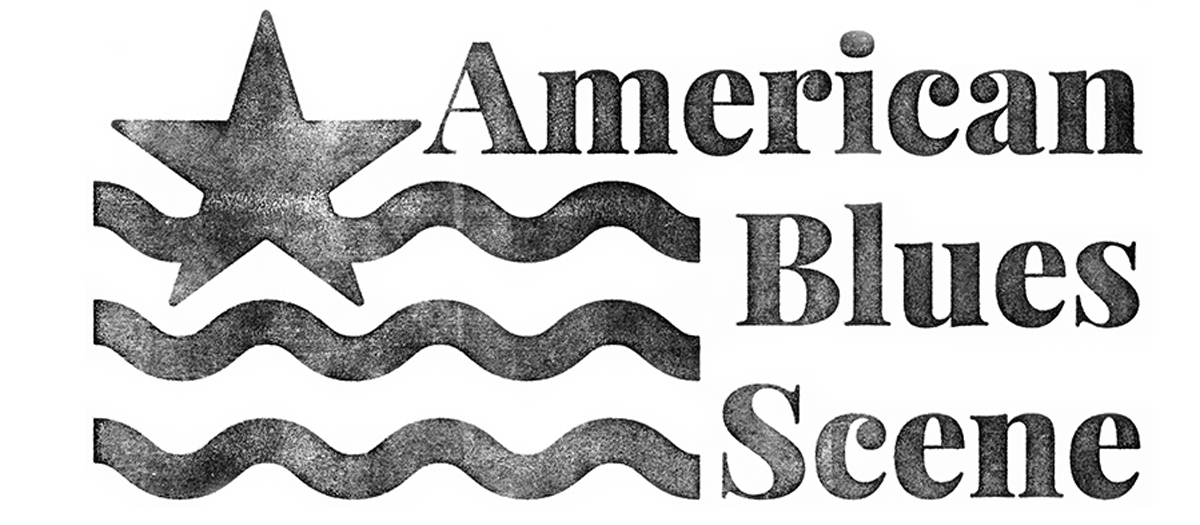
Bob Stroger: Senior Ambassador of The Blues
Don Wilcock
“I represent the blues, something everybody can’t say…” Bob Stroger talks about his new album with The Headcutters.
You can read about Bob Stroger’s new record That’s My Name on Delmark elsewhere in American Blues Scene. At 91 years old, Bob is ubiquitous in the blues scene and immediately recognizable for his broad smile and fastidious clothes, but here he opens up about himself as never before.
“Number one, I try not to think about age. When I think about age, I think, hell, I got no business out here playing, you know? But I feel good, and I don’t think about my age. I think about the music and the people who enjoy me. I just keep on going.
“Daddy used to say, ‘Age is nothing but a number, and as long as you feel good, and you felt like you wanted to do something, go and do it ’cause there are some people 30 years old that can’t do what you’re doing.’
“I’m truly blessed, so I just try and keep age out of my mind and just try and have fun doing it.”
Stroger lived in Mississippi until he was 16 and moved to Chicago. He didn’t start playing music until he was 21. “Down south in the olden days, blues was the devil’s music. So, we kind of stayed away from that. You know I was up in Chicago at 16 years old before I knowed my father even played.
“My father used to play when we were down south at house parties, but he never let us know he played music. So, he was a guitar player, yeah. I found that out when I was around 16 years old. I was – the kids couldn’t be around too much.
“Alley music they used to call it down there. That’s where the gambling joints were back in the alley in the south. Kids wasn’t allowed in the alley. That’s where the gambling joints and the pool halls were. So, we couldn’t go back there.”
Stroger wanted to play jazz, but blues was where the money was.
“I didn’t actually start playing until I was an old man. I was 21 years old when I started playing. I had a little band and when you ’re ambitious as a musician, I wanted to be sophisticated. I played jazz with Rufus Foreman who was a horn player, and he did a lot of rehearsing but couldn’t hardly get no gigs. So, to get gigs, we had to play blues. That’s when I got with Eddie King. We added Eddie King to the band. He was doing B. B. King stuff, and Johnny Taylor stuff, so we could get some jobs.
“I thought I could play Jimmy Reed, and that’s all I needed to learn about music. When I first started to play, that’s what was playing. I thought once you could do that – I wasn’t into music – didn’t reach any further than that. And he (first name?) Smith gave me a job out in West Chicago, a place called Argo. Most of the music we was playing was Jimmy Reed. So, I got fired on the spot. I’ve never been so embarrassed in my life. So, I sat this one out and learned more about music.”
In the 1950s if you wanted a paying gig, you had to wear a uniform. Today, Stroger is still known for his fancy dress. “I like to look the part because I feel better. I represent the blues, something everybody can’t say, something doing a little special. A lawyer wouldn’t go into court representing his client dressed in jeans. I feel you kinda look the part, and it comes from the old days.”
Stroger’s first band of any note was called The Red Tops. He explains where the name came from. “Well, back in the day, everybody played in uniform. You couldn’t get no job unless you were in some kind of unform. Music was really profitable, so everybody dressed up. We were too poor to buy uniforms So, my brother his girlfriend sewed some red bows on top of the tams (black tams with red circles scrawled on the top) and that’s why we were called the Red Tops. We couldn’t afford no uniforms.
“Sunnyland (Slim) wanted me to dress up. He would always tell me, ‘Your appearance is 50% of the battle, you know? People look at your appearance.’ Anyone else could dress the way they wanted, but he always wanted me to dress appropriately. So, it just came from a long line. That’s my style. I just think that’s the way I’m representing something I love.
“I’m proud of my music. I’m proud of doing a profession. I’m a professional musician, and I think I should look the part because I feel better. I represent the blues, something everybody can’t say, something doing a little special.
“I feel you kinda look the part, and it comes from the old days. Back in the day, you couldn’t play if you didn’t have a suit, a white shirt and tie. You couldn’t get no gigs because music was really respected back then. I caught on to Howlin’ Wolf, and Muddy Waters used to come to the club. Everybody was dressed up. Everybody was looking good. The other guys may be wearing jeans, but once the musician walked into the club, they knowed he was a musician by the way he dressed.”
Stoger’s gold and diamond pin are fixtures of his “uniform.”
“A friend gave me my guitar pin 50 years ago, had it made down in Mexico, and I treasure that. It was a gift, and my key chain that was (when I was with) Otis Rush. A lady came up to the bandstand, put the key chain around my neck, and then all my friends every Christmas they would add another piece to it.”
It was The King Biscuit Blues Festival that brought Stroger back down south several years ago. He often plays a set of Muddy Waters songs with Bob Margolin and Bob Corritore.
“These are my friends, we’re the three Bobs. We do a lot of stuff down there together. But yeah, the Headcutters (the Brazilian band on the new album) came down once, and I told them the whole history of it, but you really don’t enjoy it until you go there and see it. Then, you can feel it.”
Bobby Rush once told this reporter when he was young and under age that he would paint a mustache on his lips so he could play, and when he was in some clubs, they made him turn round and put a curtain in front of him because they didn’t want to see that he was black.
“Oh, yeah. Well, I came up in those days, too. There’s a place like that when I first started playing. We had to play behind the curtain. They would bring us food, and I would drink behind the curtain. I came up in those days, and I came up right here in Chicago on 47th Street years ago. We played a place on 47th and Western. We played a Friday night, and the people loved it so well, we came back Thursday night.
“The ladies was giving us tips and stuff, and one lady wanted us to come back and play for a party, and when we came back that Saturday and came to the bandstand, we were escorted out of there I guess by the Ku Klux Klan. They had sheets over their heads. But back in the day, I was from the south. I thought I was away from there. I was gonna fight, but they rushed out of there. We couldn’t work there no more. That’s right in the neighborhood where I’m living at now. That was back in the days, though.”
Stroger’s seen it all in his 91 years.
“Oh, yeah. I wouldn’t take nothing for it, though. All this is about love, you know? It’s about love. So, this life, we went through a lot, but it makes me feel good to play for audiences in this troubled world. I played a lot of audiences. They come in with the long face, and when they leave, they have smiles on their faces. We have so much fun. So, I think when I do that, I done my job, you know?
“I love my job. I’m doing something everybody can’t do. This is a profession for me. I didn’t get to school or college. I got a profession. It makes me feel good for peoples to remember me even when I’m dead and gone. Even when I’ve come and gone, my name is still carried on. That means so much to me, yeah.”
The pandemic has been rough for Stroger. “Boy, ain’t never been nuthin’ like this in my life, you know? It’s no fun me working right now because I like to play for the people, and it’s so hard for me to be on the bandstand and not connect with the people. It’s really hard on me because I wanna take pictures, sign autographs and all that. Now, you’re almost playing in a shell. There ain’t never been nuthin’ like this. You always live and learn.”
“It’s very hard. I’m playing sometimes, and I forget myself. You go home (after a a show) and say, ‘Damn, did I do something wrong?’ It’s hard. It’s really difficult, you know? Picking the jobs. I’m glad now ’cause I don’t play just to play. I like to have fun playing.”
He talks about his new album with The Headcutters. “Oh, it’s my family. It’s a band I been working with 10 or 15 years now. I got to South America playin’ that music, and those guys been playin’ together ever since they was kids. And they’re traditional blues. That’s where I came up with the CD because I really wanted a traditional harmonica player.”
Joe Marhofer’s harmonica on that album stands out.
“He sounds like he was born and bred in Mississippi. That’s what’s so amazing about this group. They play traditional southern blues, man. They really come around to me. We was down at the plantation with those guys, and they were so amazed. They wanted to come down south, so they could see it.
“They feel what they’re doing, and they’re just like my kids. They call me the Godfather. So many people in my career have helped me along, Sunnyland and all those guys. So, I just wanted to put something back and thought those guys really deserve it because it wasn’t that much. I never cared too much about CDs, you know, but I just wanted to do something with those guys because you know they really deserve it.”
The album was recorded in Brazil in 2019. “There’s a lot of traditional stuff on there. Lots of people aren’t doing that anymore, and I had some things of my own on there, and then some of my heroes. I wanted to do some of their songs on there. It’s a nice mixture of songs we put together, and we had so much fun doing it together. We pretty much talked to one another every day.”
The traditional covers include Jr. Parker’s “What Goes On in the Dark” and “Stranded in St. Louis, “Just A Bad Boy” by Eddie Tayler, “CC Rider” covered by more than 100 artists from Lightnin’ Hopkins to The Animals, “Move to the Outskirts of Town” by Casey Bill Weldon, “Keep Your Hands Off Her” by Jay McShann, “Pretty Girls” by Eugine Church, and Big Bill Broonzy’s “Just A Dream.”
There are five original songs by Stroger on the record. “It’s just a story that you tell. Most of my songs that I do, it’s my personality. I never call myself a singer. I’m mostly a performer. I tell stories, and lots of stories are about me.
“So, it wasn’t that hard doing all of this recording that was forced on me.
I never wanted to record. All I wanted to do was play, but my friend when we was in Mississppi, Big Daddy Fred. He wanted to open up a festival, a blues festival over there. He just came on to me, and he wanted to do a CD on me, and he did a CD on me playing with all the guys I was working with.
“Sunnyland always wanted me to sing. I never did sing. I did one on Earwig (She’s Got A Thing Going On in 1998), and then I worked with Willie. So, me and Kenny, he’s my son. So, we put one together for Willie. We sing on that one. Then, this one coming out now I’m doing for the Headhunters. We wanted to put one together.
“‘Something Strange” is from relationships. Another one on there, “I’m A Lonely Man,” I did for my wife when she passed. Every song has some kind of meaning to it.”
Stroger is on more than 30 records with Delmark. He misses Bob Koester who founded the label in 1953. “Me and Bob go back, oh, 30 or 40 years. I’ve been doing stuff with Bob at Delmark for years and years. This is the first time I did stuff on my own, but I’ve been recording for him for years and years. He loved my playing, but he never thought I was a singer. (Laugh) We go way back.
“I’ve been really blessed, and I love what I’m doing. Very few blues musicians get rich doing this, but I have fun. All I want to do is have fun and try to make a living at it. I ain’t trying to be a superstar. I ain’t never wanted to be a superstar. I always wanted to be able to go out and be with the audience and talk to them as friends.
“I love what I’m doing, and there ain’t too many people going to a day job that love and can’t wait to go to work, and that’s what I am. I am very fortunate. I love my job, and I love to go to work, and that’s something you don’t hear too often.”
Bob Stroger has the biggest, brightest, broadest smile of any bluesman I’ve ever met. He’s one of a kind, truly an ambassador of the blues.
Bob Stroger & The Headcutters: That’s My Name

by Philip Verhaege
Bob Stroger has had a glorious musical career, playing with the greatest of the blues business. Stoger previously appeared on more than 30 Delmark Record albums and at the age of 92 he is now making his solo album debut as a bandleader with the renowned label.
The Headcutters are a blues quartet from Brazil and a welcome addition to the Delmark family. After Bob Stroger moved to Chicago as a teenager in 1955, the great blues bassist Bob Stroger didn’t even have to get out of bed to hear some live music. He lived in the back of a nightclub on the West Side in the Windy City. And that wasn’t just the first nightclub because Howlin’ Wolf and Muddy Waters were regulars there. Despite the melancholic association with the blues sound, Stroger mainly saw the pleasure of playing on stage. His older brother-in-law happened to be Johnny Ferguson, who, along with blues legend J.B. Hutto played in the band The Twisters. Bob became a driver for the band, his first step into the music business. But he was attracted to the bass strings, practiced steadily and unfolded the enthusiastic family band project The Red Tops, with harmonica ace and cousin Ralph Ramey and his drumming brother John Stroger.
Ramey disappeared from view as soon as the band was offered a lot of touring work. Willie Kent replaced Ramey and the group went through life as Joe Russell & The Blues Hustlers. That led to a bass assignment in the 80s with the great guitarist Otis Rush. Over the next decade, Bob collaborated with pianist Sunnyland Slim and Mississippi Heat. Stroger and drummer Odie Payne also became the rhythm section of European promoter Horst Lippman, who produced the American Blues Folk Festivals, among others. Stroger’s discography resembles a lavishly stocked French sandwich shop in New York. Now Bob, The Headcutters has the rhythm section for his latest pitch, ‘That’s My Name’. The Headcutters are widely regarded as one of the most renowned blues bands in Brazil. With timbres and sounds from the 50s and 60s, they approach the sound of the legendary Chicago blues labels. The band name is a derivative and tribute to their great blues idols Muddy Waters, Little Walter and Jimmy Rogers, who were called The Headhunters in the early 1950s. The Headcutters were founded in September 1999 by four childhood friends.
Joe Marhofer (harmonica and vocals), Ricardo Maca (guitar), Arthur Catuto (acoustic bass) and Leandro Cavera (drums) form the ideal rhythm section for Bob. The thirteen songs are an amalgama of original songs and some very finely crafted covers. Stroger opens with the warm ‘What Goes On In The Dark’, originally by Herman ‘Jr.’ Parker, before continuing with Eddie Taylor’s ‘Just A Bad Boy’. The endearing ‘CC Rider’ has credits Ma Rainey. The group also captures that quintessential Chicago vibe with an unerring vibe in original songs like the piano ballad “I’m A Busy Man” and “Come On Home”. Smilin’ Bob borrowed the blues “Move To The Outskirts of Town” from Casey Bill Weldon, just like the swinging “Keep Your Hands Off Her” belongs to Jay McShann. The track ‘Something Strange’ has a sexy jazzy vibe. The ballad ‘Stranded in St. Louis’, originally by Herman “JR” Parker Jr., is colored with many accordant piano arrangements and handsome guitar riffs. Eugene Church’s ‘Pretty Girls’ has a high Chicago blues symbiosis with that exciting blues harp, just like the swinging ‘Talk To Me Mama’ and Big Bill Broonzy slow blues ‘Just A Dream’ (On My Mind), original from 1939. In the closing ‘That’s My Name’ Bob Stroger proudly sings “you can call me Bob Stroger, you can call me anything you choose, but my real name is the blues. I am the blues”. A song that also featured on the release Bob Stroger & Kenny “Beedy Eyes” Smith; “Keepin’ It Together” in 2014. Artists like Bob Stroger, who lived the Chicago blues in its classic heyday in the 1950s and early 1960s, will go down in music history. What a blast of a release! (Translated by Elbio Barilari)
See original article in Dutch, CLIC here!
HUGE SUCCESS ON THE RADIO
“BOB STROGER & THE HEADCUTTERS” ALBUM HAS BEEN AT THE TOP SINCE ITS RADIO RELEASE ON JANUARY 22nd. THIS IS THE ONLY BLUES RADIO CHART COMING FROM THOUSANDS OF RADIO STATIONS AROUND THE WORLD. https://airplaydirect.com
Delmark Records leads the blues renaissence on global radio. DJ’s, radio hosts and radio stations access for FREE to these treasures and many more by registering with AirPlay Direct, a 100% FREE service for radio professionals.
See charts here https://airplaydirect.com/charts
See and access Delmark albums available on AirPlay Direct, here https://airplaydirect.com/music/delmarkrecords
Register for FREE with AirPlay Direct, here https://airplaydirect.com


Smilin’ Bob Stroger and the Headcutters – Kickin’ out Badass Blues at 90!
Read moreBlues, Reviews, Roadhouse BluesLeave a commentBen VeeBen Vee Roadhouse Blues
Bob Stroger has been a part of the Chicago blues scene since the 1950’s. He has played his bass and recorded with Otis Rush, Jimmy Rogers, Eddie Taylor, Eddie Clearwater, Sunnyland Slim, Louisiana Red, Buster Benton, Homesick James, and Snooky Pryor, among others over the years. He has also been a session musician for the renown blues label, Delmark Records, and appeared on over 30 Delmark recordings. Now, at the age of 90, he has released his first recording for Delmark as the band leader for Bob Stroger & the Headcutters entitled That’s My Name. You aren’t going to get to hear too many more artists from that period laying down new tracks so I heartily recommend you give this album a listen. The thirteen songs include 5 originals and a delightful array of covers of Ma Rainey, Eddie Taylor, Big Bill Broonzy, Casey Bill Weldon, and Herman “JR” Parker Jr. penned tunes.
Bob, playing bass and singing, is backed on the recording by a very tight blues band out of Brazil….the Headcutters. The group consists of Joe Marhofer (Harmonica), Ricardo Maca (Guitar), Arthur ‘Catuto’ Garcia (bass) and Leandro ‘Cavera’ Barbeta (drums). There are also two Brazilian guest artists; Luciano Leaes (Piano and Hammond Organ) and Braion Johnny (saxophones) who also provide memorable moments on the recording.
Advertisements https://c0.pubmine.com/sf/0.0.3/html/safeframe.html Report this adAdvertisements about:blank Report this ad
My favorite cut on the recording is Just A Bad Boy. The group lays down a quintessential Chicago blues tune with the perfect vibe. I also loved the recording ambiance on CC Rider. It gives you the feeling of being amongst a small crowd relaxing in a smokey 50’s Chicago blues bar on a wintery week day; it’s like you are right there in the audience. Additionally, the low down blues, wailing harmonica and sultry piano playing on Outskirts of Town and It Was a Dream are priceless.
Kudos to Julia A Miller and Elbio Barilari at Delmark for bringing this project to fruition. AND a special thumbs up to the Headcutters. The core group along with the two guest artists created some music magic with Bob and I look forward to hearing some of their own recordings in the future.
On the title cut That’s My Name, Bob sings that ” you can call me Bob Stroger, you can call me anything you choose, but my real name is the blues. I am the blues.” And that he is!! The likes of Bob Stroger, who lived the blues in its classic heyday in the 50’s and early 60’s, are passing into music history. Grab some of this history in the making right now while you can and enjoy the baddest of the badass Chicago blues!!
Bob Stroger & the Headcutters – That’s My Name (Delmark Records 2022)
Ben Vee started out spinning songs on terrestrial radio and at nightclubs back in the 1970’s in his home state of Louisiana. After a career in the construction business, he returned to DJing in 2011. He now hosts two shows each week on http://www.bluesmusicfan.com and writes about the blues at http://www.benveeblues.com from his home in Connecticut. He also has a 24 hour stream devoted to the Roadhouse Blues… WRHB
WATCH & LISTEN to Bob Stroger introducing his album with The Headcutters from Delmark Records Riverside Studio
Bob Stroger & The Headcutters have a long history together, click, watch, listen and enjoy…
THE ALBUM
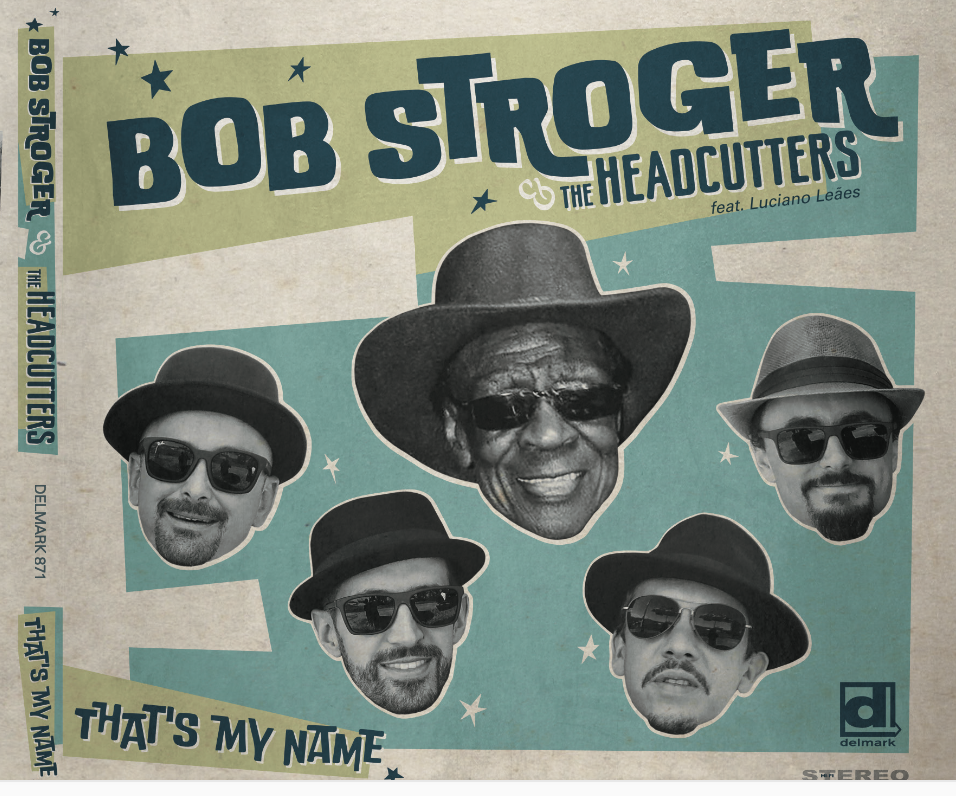
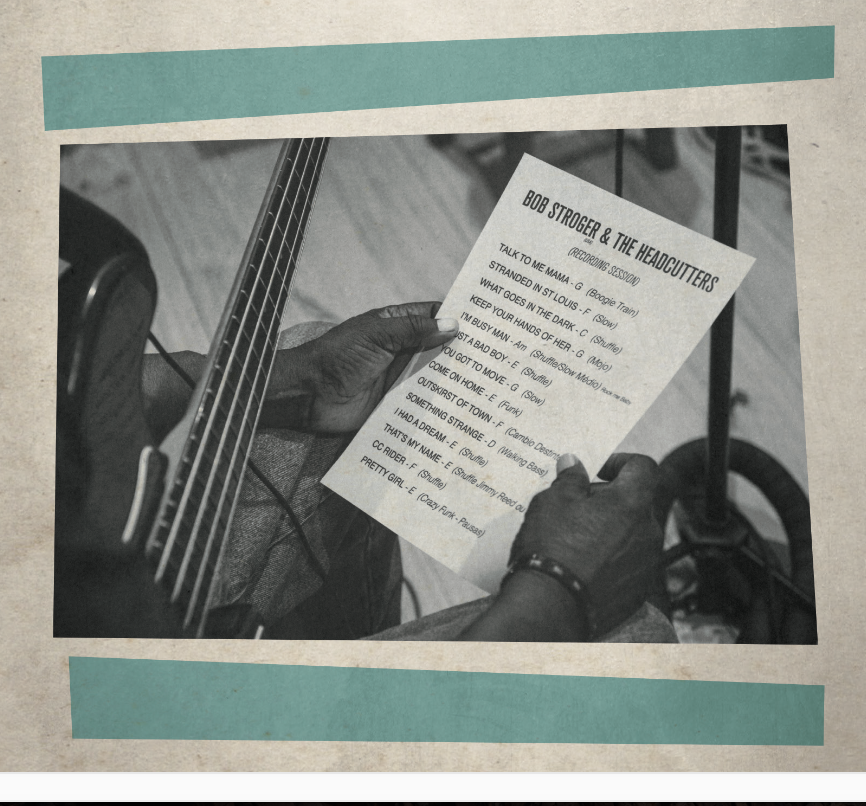
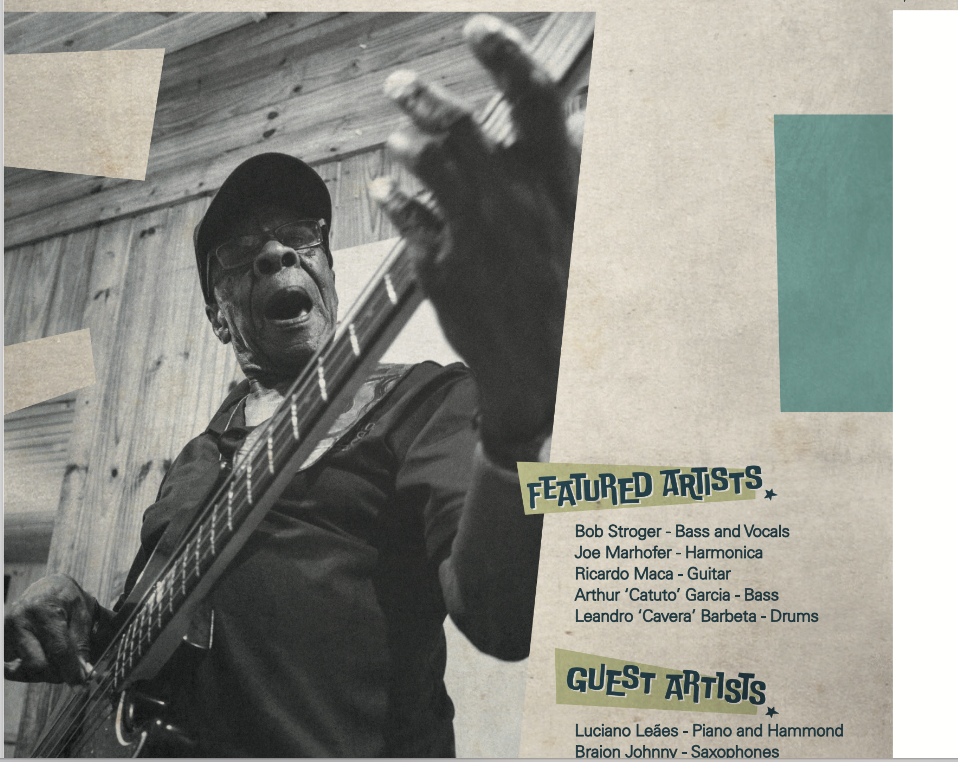
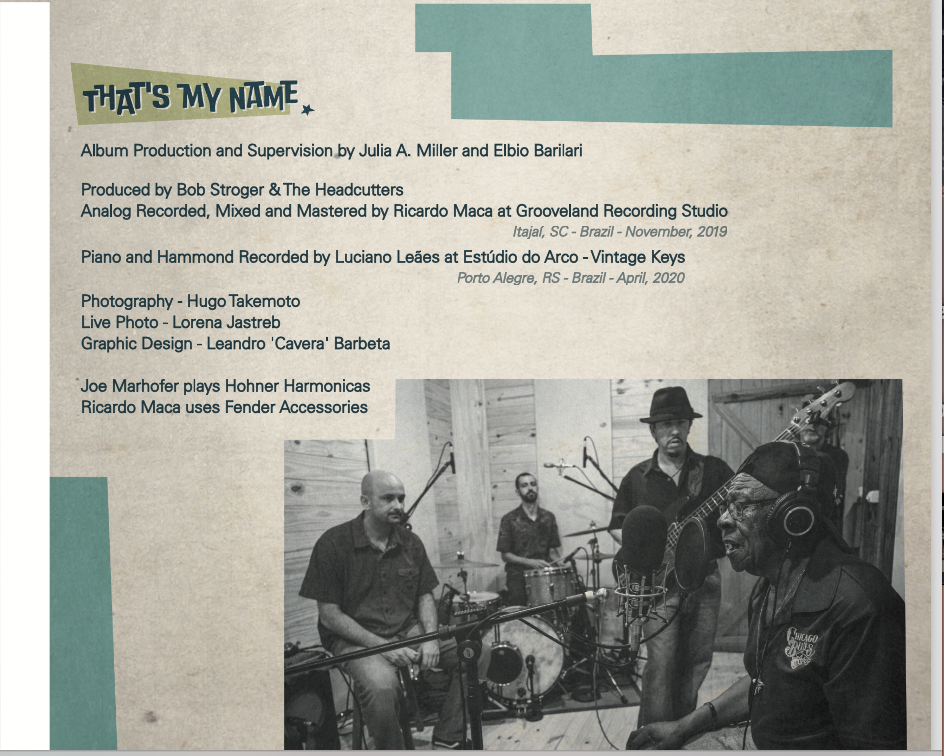







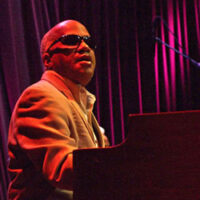















.jpg)
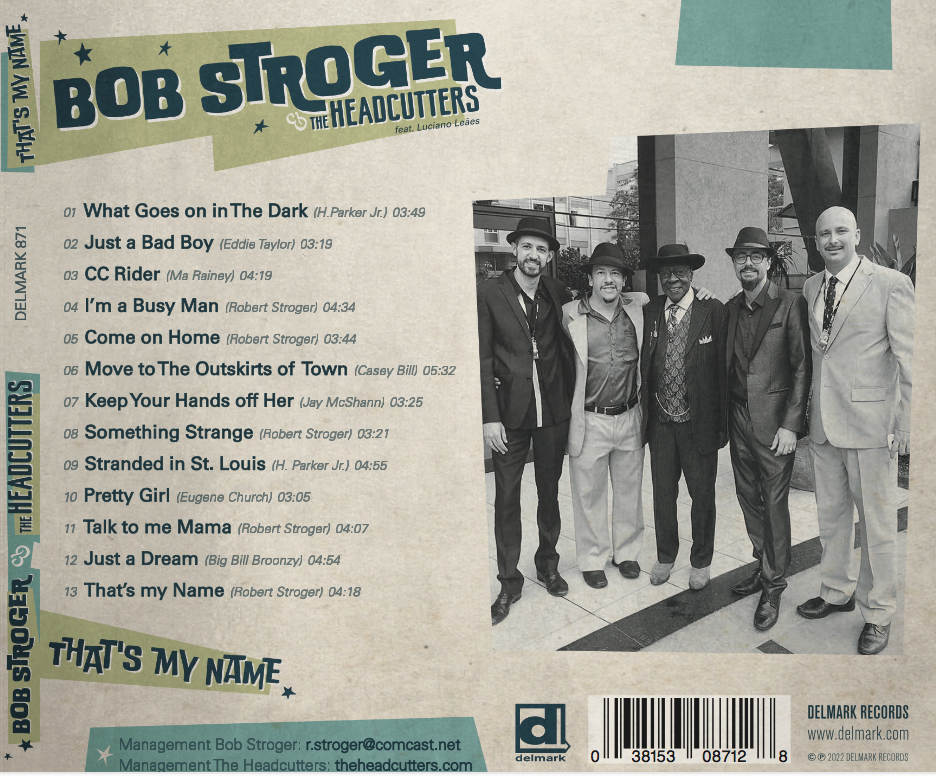



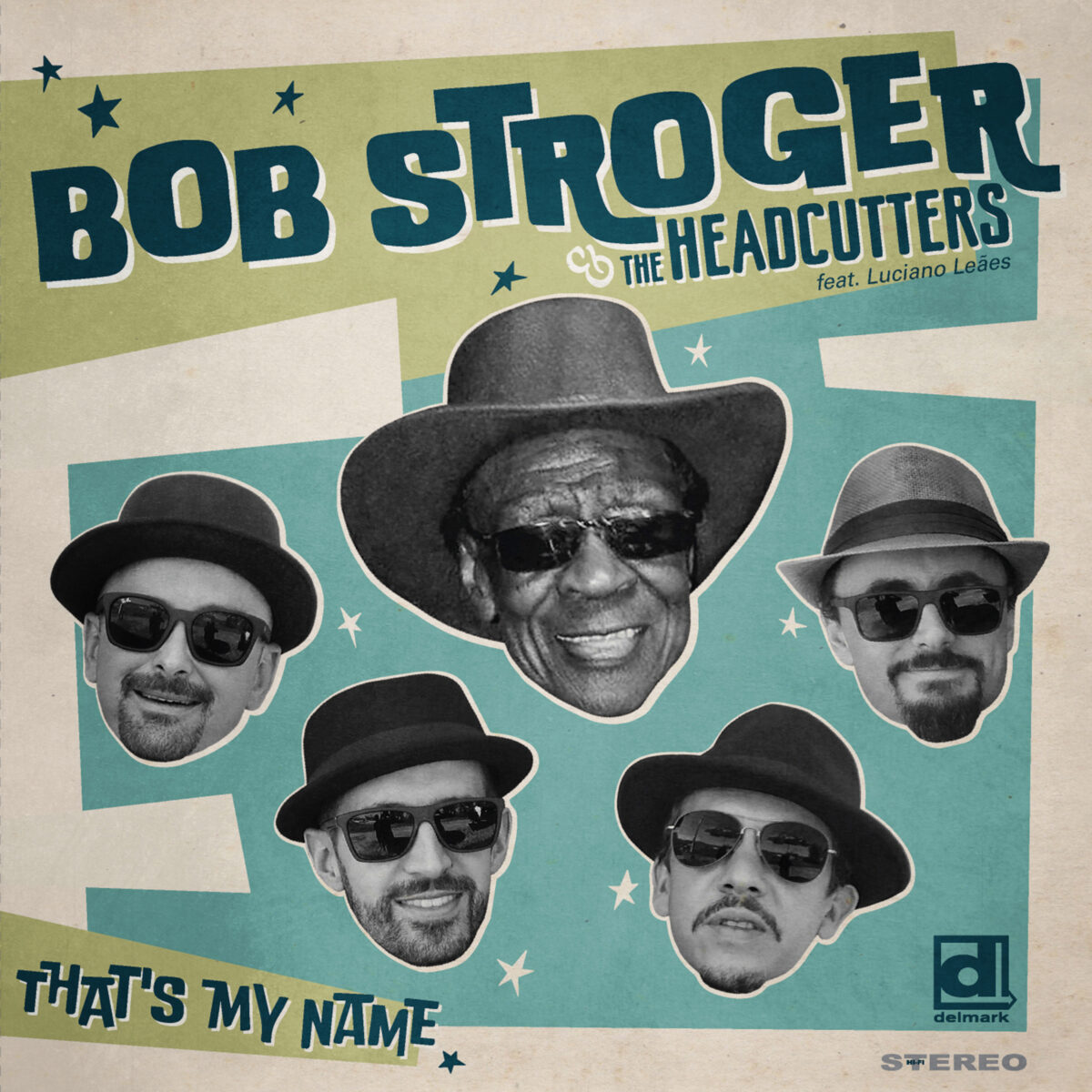







One thought on “CLICK! Bob Stroger & The Headcutters praised around the world: read reviews, watch VIDEOS”